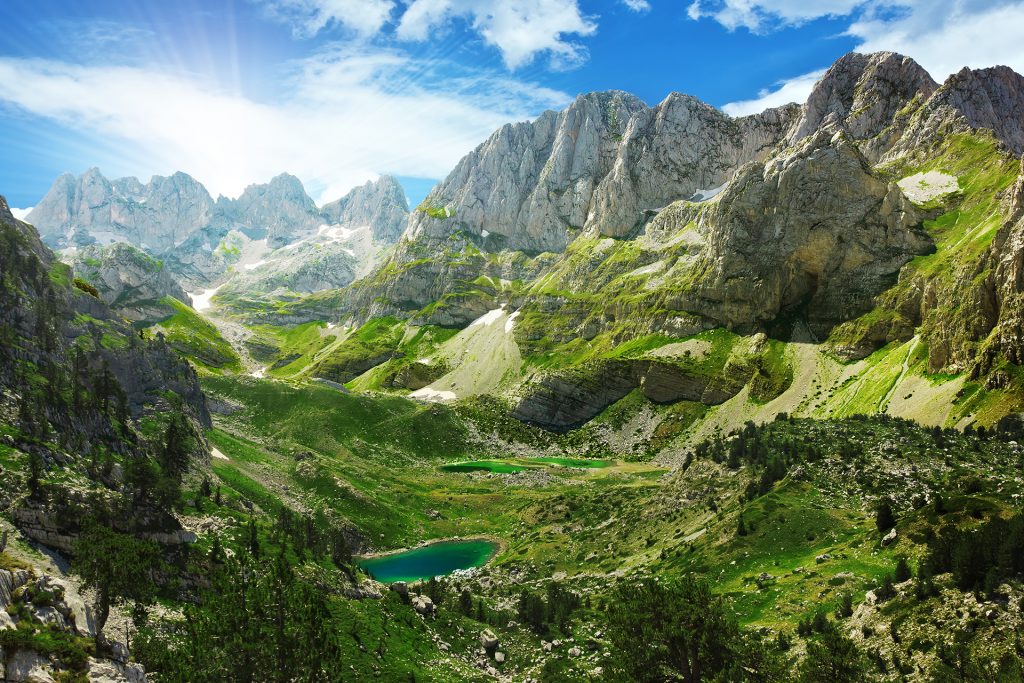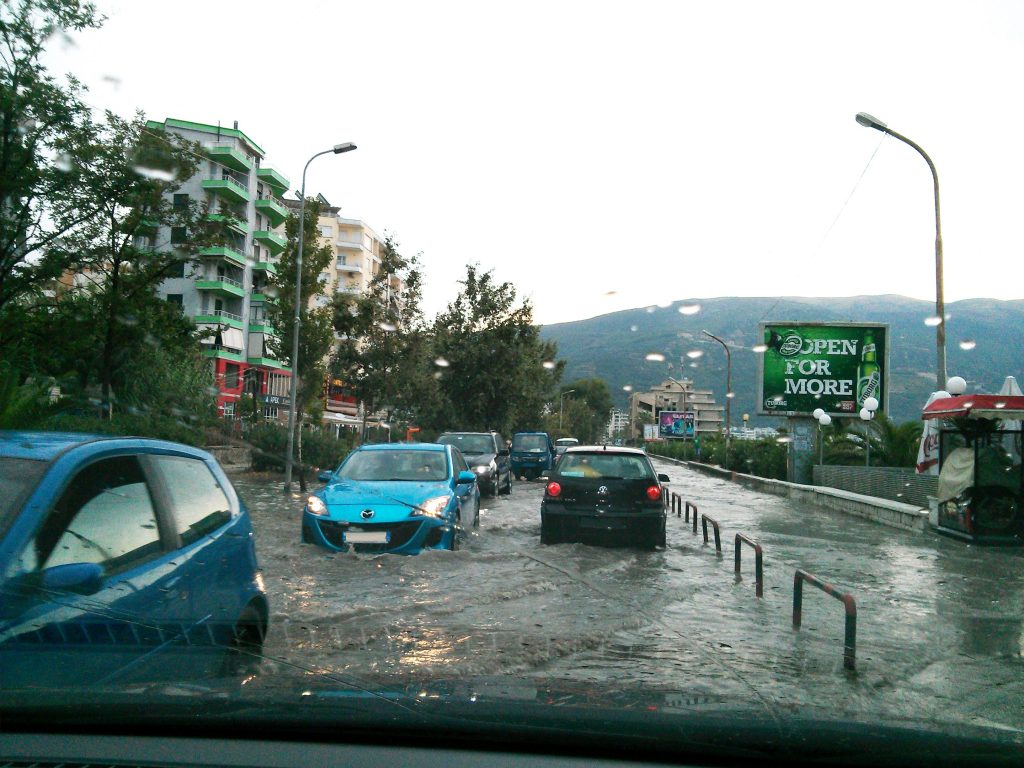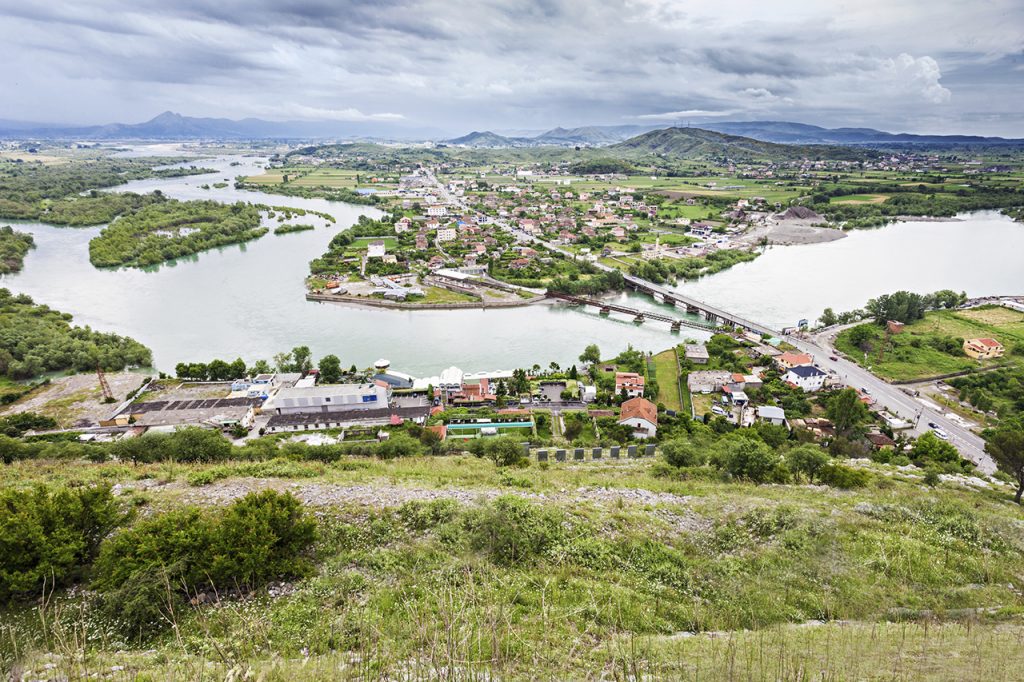Albania is suffering from the effects of extreme weather events such as flooding, droughts and heat waves. During the last 10 years, floods have devastated regions and cities such as Shkodër, Tiranë, Vlorë and Fier, and posed a significant threat to Albania’s economy, ecosystems and people’s health.

Recurring floods caused USD 218 million in damage between 1997 and 2017 and directly affected more than 550,000 inhabitants. According to the European Environment Agency, Albania shows the highest level of drought severity per decade in Europe. The country ranks highest among European countries in terms of exposure and vulnerability to natural hazards and extreme events.
On one hand, like other Balkan countries, Albania is categorized as a non-Annex I country under the United Nations Framework Convention on Climate Change (UNFCCC), with limited emissions due to the lack of heavy industry and with 100 per cent of its power generation coming from renewable energy. On the other hand, the impacts of climate change in Albania are substantial.
Albania’s Progress in Adapting to a Changing Climate
Hence, the Government of Albania recognizes climate change adaptation as a key priority. This commitment led to the creation and mobilization of the Inter-Ministerial Working Group on Climate Change (IMWG) as a result of the National Adaptation Plan (NAP) process. This working group was established in 2014 by the Council of Ministers and is chaired by the Ministry of Tourism and Environment. Its objectives are to improve the cooperation between all relevant stakeholders on climate change.
Albania’s NAP document has been developed within the cooperation structure of the IMWG with the support of the German Cooperation Agency (Gesellschaft für Internationale Zusammenarbeit [GIZ]) under the overarching regional project, entitled Climate Change Adaptation in the Western Balkans, undertaken by GIZ on behalf of the German Federal Ministry for Economic Cooperation and Development. Albania’s main sectoral priorities are:
- Integrated water resource management/flood protection
- Coastal ecosystems management
- Climate-resilient irrigation, drainage and flood protection
- Sustainable agricultural intensification/adapted farm production
- Sustainable land use planning and management/population and settlements
- Housing/green cities/initiative for municipal adaptation
- Upgrading civil defence preparedness and disaster risk reduction
- Climate-proof infrastructure
- Promoting implementation of adaptation strategies for the health sector
In 2016, a Green Climate Fund (GCF) preparedness program was launched with a main focus of establishing and strengthening the National Designated Authority as well as developing strategic frameworks for engagement with the GCF, including the preparation of country programs.

While Albania has been an avant-garde country in the field of adaptation, it also has experienced challenges—particularly with the political changes in 2017 that resulted in a new institutional set up. Nevertheless, Albania has continued to advance the NAP process through its involvement in sector-based projects supported by multilateral and bilateral agencies.
Today, Albania is the only country in the Balkan region to have developed a NAP document. The NAP and its financing strategy became an integral part of the National Strategy on Climate Change, and related action plans on mitigation and adaptation, which was approved by the government on July 2, 2019. The strategy is cross-cutting, with both a general policy objective and concrete mitigation and adaptation actions.
Support Leveraged from the NAP Global Network
Upon the finalization of the NAP document, a NAP Assembly was organized on June 29, 2016. Albania was the first country to organize a NAP Assembly with the crucial assistance of the NAP Global Network. It was designed to foster local capacities for the NAP process, to ensure that the priority adaptation actions identified during the process will be implemented and to promote the coordination of development assistance at the national level.
The partnership between Albania and the NAP Global Network since 2016 has been successful in pushing the country’s adaptation agenda forward. For example, it has helped to mainstream adaptation into midterm budget planning and defined climate-proof indicators for regional infrastructure projects. Another example is the support to Action 12 of the NAP to develop and implement municipal climate change adaptation plans. NAP Global Network support is also key in helping fill gaps caused by institutional changes.
Building Urban Resilience Through the NAP Process
Most recently, the Ministry of Energy and Infrastructure was able to continue its efforts in moving forward in its adaptation agenda. Through support from the NAP Global Network, a full funding concept note on urban resilience to climate change was drafted as a next step toward the implementation of NAP Action 12, the Initiative for Municipal Climate Change Adaptation Plans.

Implementing Action 12 is expected to cost USD 50 million, mostly paid for through grants, and thus a strategy to access financing for this implementation is essential. Albania’s NAP document recommends seeking commitment and financial support from international institutions, international funds and investments banks as well as from local funders.
Some lessons can be drawn from the development of the concept note. The adaptation needs in Albania are very important in terms of designing climate-proof infrastructures, developing human and institutional capacities, raising awareness within the municipalities and integrating climate change into the city planning. The financial resources to fund these exist, for instance within the Green Cities Facility; however, the challenge is as much about identifying the resources, as it is about how to access them, which requires time and a certain expertise. The process of developing the concept note involved consultations with all the key actors in Albania and the main donors to set out a clear path for the Ministry of Energy and Infrastructure to better reach the donor community for financial and technical support. This will also enrich how Albania uses funding already secured from the GCF.
Albania has a long road ahead in terms of building resilience, and it is committed to pursuing its climate agenda—but this cannot be done alone. The partnership with the NAP Global Network is a chance to open up new opportunities for supporting the country.
Any opinions stated in this blog post are those of the authors and do not necessarily reflect the policies or opinions of the NAP Global Network, its funders or Network participants.
Read more about financing NAP processes.
[i] World Bank Group. (2017). Disaster Risk Profile: Albania. (p. 2). Retrieved from https://www.gfdrr.org/sites/default/files/publication/drp_albania.pdf;United Nations Office for Disaster Risk Reduction. (n.d.) DesInventar – Albania. Retrieved from https://www.desinventar.net/DesInventar/country_profile.jsp?countrycode=alb&lang=EN;
European Commission. (2015, September). Flood prevention and management: Gap analysis and needs assessment in the context of implementing the EU Floods Directive (p. 5). Retrieved from https://europa.ba/wp-content/uploads/2015/09/FLOOD-PREVENTION-AND-MANAGEMENT-GAP-ANALYSIS-EXECUTIVE-SUMMARY1.pdf; United Nations (2015). Albania: Post flood needs assessment report (pp.12, 17);
DRR-Team Albania. (2015, September). Scoping Mission Report Albania (p. 4). Retrieved from http://www.drrteam-dsswater.nl/wp-content/uploads/2015/10/DRR-Team-Albania-Mission-Report.pdf;
Reliefweb. (2018). Albania: Floods – Emergency Plan of Action Update n°1 – Operation n°MDRAL007. Retrieved from https://reliefweb.int/report/albania/albania-floods-emergency-plan-action-update-n-1-operation-n-mdral007